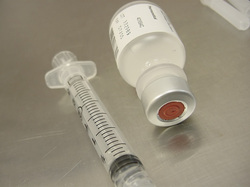
So I was interested to come across a recent paper by German economists, Berno Buechel, Eike Emrich and Stefanie Pohlkamp called "Nobody's Innocent: the role of customers in the doping dilemma". The paper explores, using a game theory model, the behaviour of sports fans (customers) in response to doping scandals. They begin with the assumption that there would be a disincentive to dope where customers/fans would withdraw support in response to a doping scandal. In fact their model suggests that this reaction from fans could lead to more doping where it leads to sports organisers conducting fewer tests.
The paper models the interaction of decisions by athletes, organisers and fans. It argues that:
We have so far established that the unique equilibrium outcome is d-n-s ( i.e. Athletes dope, Organizers do not test, and Customers stay supporters). The real world prediction of our simple model is thus that the number of dopers is large, while the probability of a doped athlete to be caught and punished is close to zero. The real extent of doping within professional sports is hard to assess and thus remains highly controversial. Theoretically, there are strong incentives to use performance-enhancing drugs. In particular, if our second prediction holds - that the probability of being detected and punished is small. The explanation that our model provides for doping is that organizers do not want to uncover the full extent of doping because they anticipate that they would suff er losses in the case of scandals.
The paper suggests two possible solutions to avoiding the incentive structure that may lead to athletes doping based on an 'under-testing' by worried organisers. The testing could be taken over by an organisation outside of the sport, perhaps a state-run body. Although the writers don't consider it I expect this could be unworkable since most sports are multinational and countries may also have less than strong incentives to test their own athletes when other countries have less stringent testing.
Second they suggest that organisers should be forced to issue full information on activities in dope testing, releasing information on all tests and not just those that result in positive outcomes. While there may be difficulties in releasing some of this sensitive information they argue that WADA could provide a simple rating system for sports or events that provides more transparency and information for fans. They say that:
A much simpler suggestion is that the WADA [World Anti-Doping Agency] makes public to which extent sports associations and NADAs comply to their fight against doping. This could be a simple rating which gives Customers a clear signal about which disciplines and events are credible in their fight against doping. Of course, this requires independence on part of the WADA, which is also doubted (Eber, 2002; Preston and Szymanski, 2003), but, in principle, we conclude that there should be an independent rating or certifying agency that offically measures to which extent certain sports events have implemented an anti-doping regime. Whether or not doping prevails in the future is then in the hand of the Customers.
 RSS Feed
RSS Feed